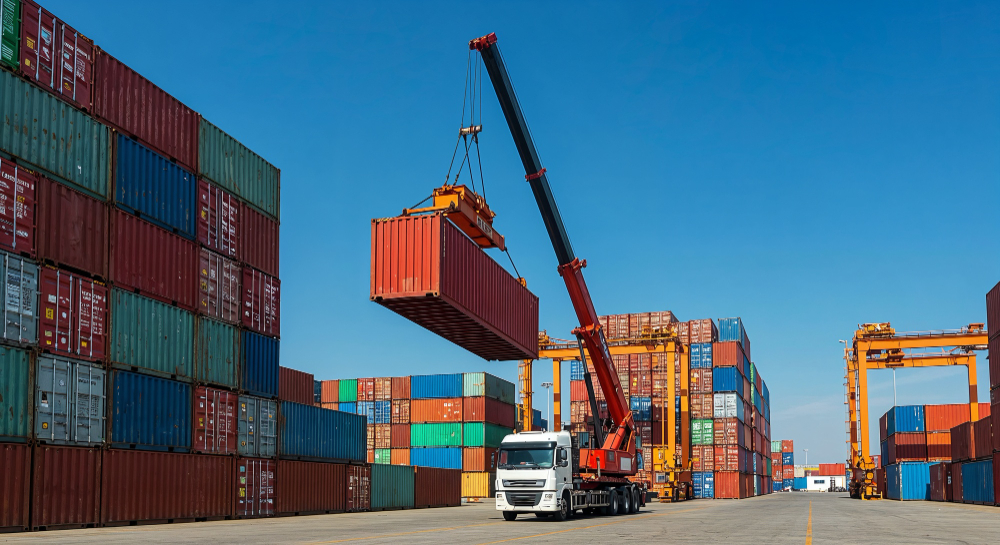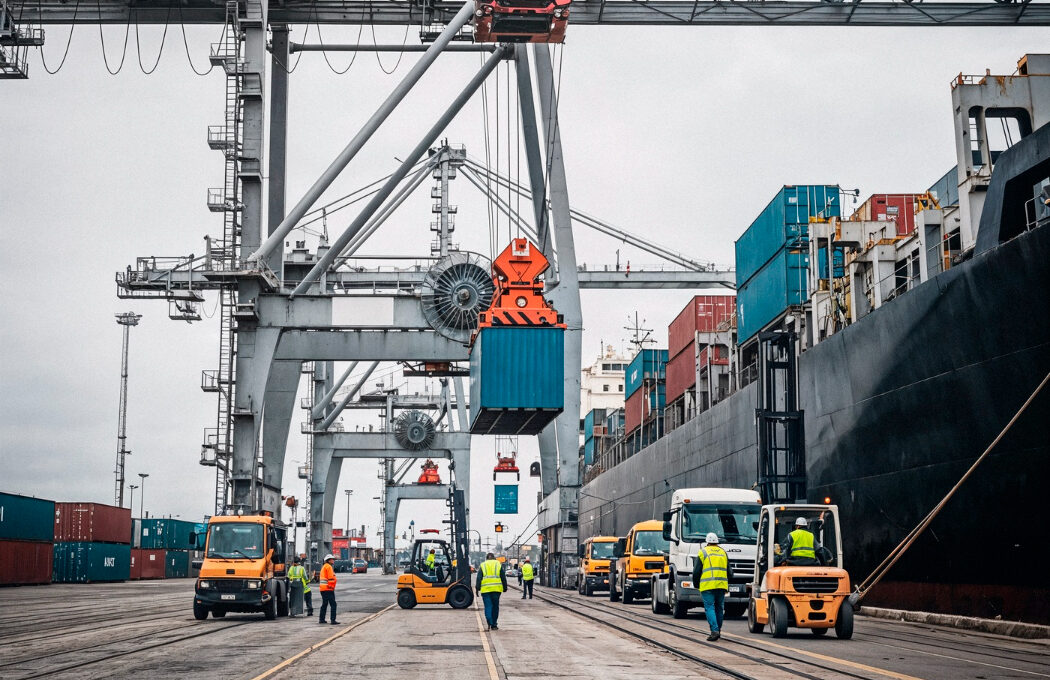Key Takeaway
✔ A freight broker acts as a strategic middleman between shippers and carriers.
✔ Freight brokerage adds efficiency, saving time and operational costs.
✔ Brokers make money through commissions based on shipment margins.
✔ Modern brokers use tech-driven tools to secure and manage loads.
✔ Partnering with an experienced broker like 3PL Logistics By Best ensures reliability and long-term value.
Table of Contents
Freight brokers are the unseen link that keeps America’s goods flowing — connecting shippers and carriers, cutting costs, and ensuring freight never stops moving. If you’ve ever wondered what is a freight broker and why they’re vital to modern logistics, this guide breaks it all down.
What Is a Freight Broker?
A freight broker acts as a middleman between shippers who need to transport goods and carriers who have the capacity to move them. They don’t own trucks or warehouses — instead, they manage the complex coordination that ensures freight gets from point A to point B efficiently.
In the world of freight brokerage, these professionals are problem-solvers, negotiators, and logistics strategists. They bridge the gap between supply and demand in transportation, helping businesses of all sizes move goods faster, more cost-effectively, and with fewer operational headaches.
Working with a licensed freight broker means having an expert who understands rate trends, regulatory compliance, and carrier reliability — saving both time and money in the shipping process.
What Exactly Does a Freight Broker Do?
The daily work of a freight broker goes far beyond making phone calls. They manage the entire transportation process from start to finish. By managing these details, freight broker services help shippers maintain smooth, dependable operations without dedicating internal resources to logistics management.
- Matchmaking shippers and carriers: Brokers identify the best carriers for each load, balancing cost, timing, and reliability.
- Rate negotiation: They secure competitive rates while ensuring fair pay for carriers.
- Paperwork and compliance: From bills of lading to insurance certificates, brokers handle the documentation that keeps shipments legal and traceable.
- Tracking and communication: Brokers monitor each shipment and handle unexpected issues — delays, route changes, or weather disruptions.
Quick Facts: Freight Brokers at a Glance
- Core function: Connect shippers with carriers to move goods efficiently.
- Earnings model: Commission-based — usually a percentage of each shipment’s value.
- Licensing: Must be registered with the Federal Motor Carrier Safety Administration (FMCSA).
- Tech advantage: Use transportation management systems (TMS) and load boards.
- Industry value: The U.S. freight brokerage market exceeds $100 billion annually.

How Does a Freight Broker Get Loads?
Freight brokers thrive on relationships, reputation, and technology — three pillars that determine how successfully they can source and move freight. In an increasingly digital logistics landscape, brokers use both human connections and modern platforms to keep their freight pipelines full and profitable. Here’s how they do it:
1. Partner Directly With Shippers
One of the most effective ways a freight broker gets loads is by forming direct relationships with shippers. Brokers build trust by consistently delivering on promises — ensuring freight moves on time, within budget, and without complications. Over time, this reliability earns them long-term contracts and repeat business. Many brokers specialize in particular industries (such as food, retail, or manufacturing), which helps them tailor solutions to the unique shipping needs of those sectors.
2. Use Load Boards and Digital Freight Platforms
Load boards remain a core tool for freight brokers. These are online marketplaces where shippers post available loads and carriers or brokers bid to move them. Advanced digital freight platforms take this process further — automating matchmaking between available freight and capacity, often in real time. Successful brokers use these tools strategically, blending automation with personal relationships to secure the best opportunities while maintaining control over margins.
3. Leverage a Trusted Carrier Network
Every experienced freight broker knows that strong carrier relationships are just as important as shipper partnerships. A well-maintained carrier network allows brokers to move loads faster, reduce downtime, and handle last-minute changes with confidence. Brokers vet their carriers carefully for insurance coverage, safety records, and reliability. By maintaining communication and offering fair, timely payments, brokers build loyalty — ensuring that trusted carriers prioritize their freight over competitors’.
4. Act as a Strategic Logistics Broker
A skilled broker doesn’t just move loads — they act as a logistics strategist. Using real-time data, market insights, and route optimization tools, brokers identify profitable, high-volume lanes that align with carrier capacity and seasonal demand. This proactive approach allows them to anticipate market shifts, balance pricing, and create win-win arrangements for both shippers and carriers.
5. Network, Market, and Build Visibility
Beyond digital tools, freight brokers also market their services through networking events, cold outreach, and digital marketing. Many invest in SEO, LinkedIn networking, and referral programs to attract shippers seeking dependable partners. Reputation travels fast in logistics — a broker known for transparency and consistency rarely runs short on opportunities.
Do Freight Brokers Make Money?
Yes — and often quite well. Most freight brokers operate on a commission-based model, earning a margin between the carrier rate and the shipper rate.
A broker might, for example, pay a carrier $2,000 to move a shipment and charge the shipper $2,300. The $300 difference is the broker’s gross profit. While margins can range from 10–20%, the real profitability comes from volume, efficiency, and strong relationships.
Successful brokers scale their business by automating communication, using transportation management systems, and maintaining reliable carrier partnerships — all while delivering measurable value to their clients.
What Is the Difference Between a Freight Broker and an Agent?
While freight brokers and freight agents both work within the transportation industry, their roles, responsibilities, and authority differ significantly. Many people use the two terms interchangeably, but understanding these distinctions is key to knowing what does a broker do and how they operate compared to an agent.
Both professionals help connect shippers with carriers, but only one carries the full legal and financial accountability for each shipment — and that’s the freight broker.
Freight Brokers: The Licensed Operators
A freight broker is a fully licensed business entity authorized by the Federal Motor Carrier Safety Administration (FMCSA) to arrange transportation between shippers and carriers. Brokers carry the legal responsibility for ensuring every transaction is legitimate, insured, and properly documented.
They must also maintain a surety bond (BMC-84) or trust fund (BMC-85), which protects shippers and carriers from financial loss in case of disputes. This level of accountability makes freight brokers a vital, regulated part of the logistics ecosystem.
In addition to compliance, brokers typically invest in technology such as Transportation Management Systems (TMS), load boards, and digital freight tools that help them optimize routes, track deliveries, and manage billing.
Freight Agents: The Independent Connectors
A freight agent, by contrast, operates under a broker’s authority but doesn’t hold an FMCSA license themselves. Agents act as sales and customer relationship specialists — they secure freight, communicate with shippers, and negotiate rates on behalf of the broker.
Because agents are independent contractors, they don’t assume legal or financial risk. The freight broker they represent takes on the liability, compliance, and payment responsibility for every load booked through the agent.
This arrangement allows brokers to expand their reach while giving agents the flexibility to work independently and earn commission-based income.

Comparison Table: Freight Broker vs. Freight Agent
Category | Freight Broker | Freight Agent |
Legal Authority | Licensed by the FMCSA; holds brokerage authority | Operates under a broker’s authority |
Liability & Compliance | Legally responsible for all shipments and contracts | Not liable for freight or compliance issues |
Insurance & Bonding | Must carry a surety bond (BMC-84) or trust fund (BMC-85) | Covered under the broker’s bond and insurance |
Business Model | Owns and manages a licensed brokerage business | Independent contractor or subcontractor |
Core Role | Handles operations, carrier vetting, and financial transactions | Focuses on sales, customer acquisition, and service |
Revenue Structure | Earns profits from freight margins | Earns commission from freight booked |
Technology Use | Utilizes TMS, load boards, and freight tracking systems | Relies on broker’s systems and network access |
Risk Exposure | Bears full financial and legal risk | No financial risk; relies on broker compliance |
Client Relationships | Builds long-term contracts with shippers and carriers | Manages and maintains daily communication with clients |
Example | 3PL Logistics By Best — a licensed freight brokerage | Independent representative working under 3PL Logistics By Best |
Why Businesses Partner With a Freight Broker
For most businesses, working with a freight brokerage partner isn’t just about convenience — it’s about performance and cost control.
Here’s why companies turn to experts like 3PL Logistics By Best:
- Access to a vast carrier network: Find trucks faster and reduce downtime.
- Simplified logistics: Brokers handle the details, from contracts to delivery updates.
- Better pricing leverage: Brokers negotiate competitive rates on your behalf.
- Scalable service: Whether shipping one load or hundreds, brokers adjust capacity to meet your needs.
- Regulatory compliance: They ensure every shipment follows DOT and FMCSA regulations.
A logistics broker brings clarity and confidence to what can otherwise be a high-stress part of running a business.
Frequently Asked Questions | Common Questions About Freight Brokers (FAQ)
What does a freight broker do for shippers?
They coordinate shipments, find the right carriers, and handle paperwork to save shippers time and costs.
Is a logistics broker the same as a freight broker?
Yes, both terms refer to professionals who connect shippers and carriers, though “logistics broker” often emphasizes broader supply chain management.
How do freight brokers find reliable carriers?
Through digital load boards, carrier databases, and vetting processes that ensure compliance, insurance, and service quality.
What are the requirements to become a freight broker?
Brokers must register with the FMCSA, secure a surety bond, and obtain business insurance.
Are freight broker services worth it for small businesses?
Absolutely — they simplify logistics, improve pricing, and provide access to carrier networks small businesses may not have on their own.

Take Control of Your Freight Operations With 3PL Logistics By Best
Whether you’re a small business managing your first shipment or an enterprise expanding nationwide, a freight broker can make or break your logistics efficiency.
3PL Logistics By Best specializes in reliable freight brokerage and customized logistics solutions that help your business move smarter, faster, and with greater control.
Take the next step — request a quote or consultation today and experience the power of professional freight management.

